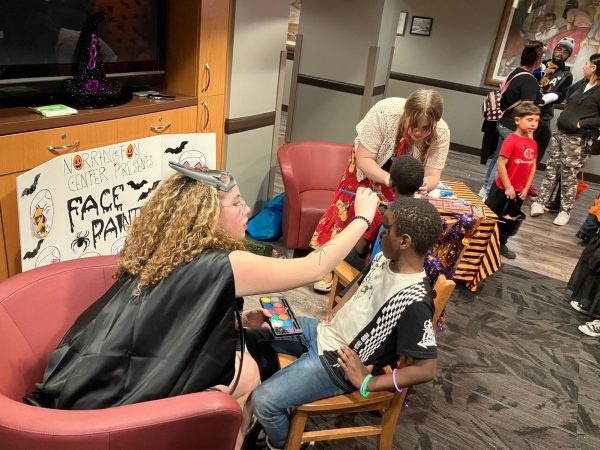The value of debate
It’s not difficult to get in an argument today. It can be done at work, at school, home, in line at the post office, waiting for a bus and that’s just one morning before you even log onto social media. For all the opportunities to engage in a friendship ruining battle of words, little ever seems to come of it. Park’s Assistant Professor of Communication, Lora Cohn, Ph. D. would like to change that, so she’s fighting fire with fire and starting a debate team.
“Debate, in particular, teaches you to see things from multiple perspectives and to take your own personal beliefs out of the equation,” says Cohn. “You learn how to develop arguments that are supportive of positions that are not yours. And in doing that, and learning how to distance yourself from the arguments, you are better able to listen to others and hear and evaluate their arguments and not be blinded by the emotion.
“We’re really blinded by emotion. So we need more people to be able to emotionally divest and really evaluate our arguments.”
In addition to traditional debates, the team will practice multiple public speaking, presentational, and acting and interpretation based events, each with their own benefits outside of competition.
“Extemporaneous speaking, for example,” says Cohn. “You learn to write a speech quickly and research quickly and to be articulate. It also teaches you to research. We need to train people to better evaluate sources and evidence. Debate certainly teaches you that skill. If we want more leaders, if we want more rational and critical thinkers and leaders it’s time for debate and forensics.”
The following topic was proposed as an exhibition debate. Contributors were education and social work double major Lily Ramirez Burley and U.S. history major with a legal studies minor Alexander Hyatt.
The goal between the Deferred Action for Childhood Arrivals (DACA) and the DREAM act (Development, Relief and Education for Alien Minors Act) is roughly the same. DACA was originally an Obama era executive order whereas a similar act the DREAM act is something Democrats have been trying to pass for nearly 20 years. Both acts want to establish a policy for children whose immigrant parents brought them here underage illegally to gain a level of legal citizenship or residency.
Resolution: Should the US pass and maintain DACA and the DREAM act?
Pro–
Our country is founded on principles of freedom and unity, with the Declaration of Independence chastising King George III for “obstructing the Laws for Naturalization of Foreigners; refusing to pass others to encourage their migrations hither.” While the constitution does not give direct instruction on how to handle immigration, we must acknowledge the U.S. was founded by immigrants. Today, many immigrants from poor and struggling countries look toward the U.S. with hope of a chance to start a new life. We lose sight of the fact that these are human lives wee are dismissing when deciding their fate for them. I don’t advocate for deportation of any kind however in the case of DACA and the DREAM act, those involved are particularly blameless. Their parents came here illegally. Much like any other child, they had no say in what their parents did.
In light of the founding father’s wisdom on the importance of immigrants to our country, the responsibility for human lives placed on anyone considering immigration issues in general, and the lack of guilt on the part of the dreamers in particular, all point to the urgent necessity of the U.S. passing or maintaining the DACA and the DREAM act immediately.
Con–
The U.S. should not pass or maintain DACA because it is a temporary fix for a larger problem of needed immigration reform. The DREAM act not only grants illegal immigrants citizenship and their close family residency but also allows illegal immigrants to take advantage of state and federal institutions such as state colleges.
In just the short term these DREAMers, who tend to be from low-income families, will create a heavy burden upon the social institutions that they now have access to. Any supposed economic boon will come after years of chaos and hardship as governmental institutions seek to deal with this rapid influx of low income DREAMers.
However the alternative to this chaos is not coldness. These are people risking their lives to enter this country, while yes illegally, in the end immigration reform should be the focus before amnesty for illegal immigrants. While we focus on DACA and the DREAM act, illegal immigrants will be vindicated by this new avenue towards citizenship.
It is not unreasonable to assume that lenient legislation such as this will prompt a surge of illegal immigrants seeking this future amnesty. There are alternatives to the illegal immigration issue besides amnesty, which will only come at the cost to our citizens; while we put our citizens in harm’s way can we really call ourselves humanitarian?
Responses welcome
When contemplating these points, please consider the benefits of an objective consideration of the facts, rather than the way an issue makes you feel. If you find one of the arguments themselves using emotion more than fact, consider why that might be. If you find yourself enjoying this approach to the issues, the new debate team at Park might be for you. For interest or questions, or to weigh in on this week’s topic or recommend one for the future, go to [email protected] .
“Especially now when we’re so polarized as a nation, we need to get back to some of the skills and we need people to have some of the skills that debate and forensics gives you,” says Cohn.
Your donation will support the student journalists of Park University. Your contribution will allow us to cover our annual website hosting costs, freeing up other funds for equipment, printing and training.









